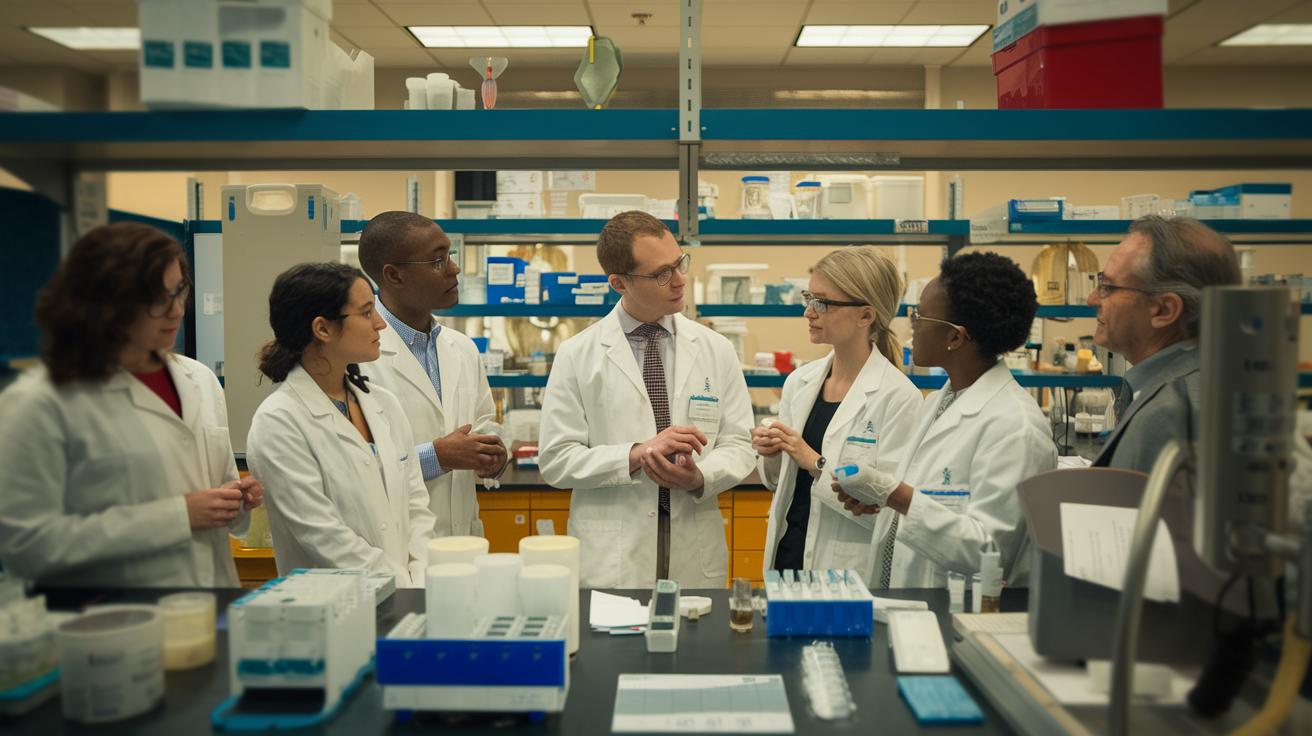Are new drug trials pushing the boundaries of medical science, or are they fraught with hidden risks? In the dynamic field of pharmaceuticals, these trials are the proving ground for groundbreaking therapies. They epitomize an intricate balance where potential transformation meets meticulous scientific scrutiny. This article delves into the transformative potential of new drug trials, offering insights into their phases and critical significance in the journey from a laboratory hypothesis to real-world application. Readers will gain a clearer understanding of the pivotal role these trials play in launching innovative treatments that could redefine patient care.
The Overview of New Drug Trials

New drug trials play a pivotal role in the development of pharmaceuticals by rigorously evaluating new treatments to ensure their safety and efficacy for public use. These trials are designed to meticulously assess the impact of the medications on human health, identifying potential benefits and side effects prior to regulatory approval. The primary objectives include determining the optimal dosages, understanding pharmacokinetics and pharmacodynamics, and confirming therapeutic benefits in targeted populations. Such trials are indispensable in translating laboratory research into viable medical solutions, contributing to the advancement of medical science and improvement of patient outcomes.
The clinical trial process is segmented into distinct phases, each serving a unique purpose in the drug development pipeline. Phase I trials are the initial step, focusing on safety and dosage by testing a small group of healthy volunteers or patients. Phase II trials aim to evaluate the efficacy of the drug, involving a larger group to assess therapeutic effects and further investigate safety. Phase III trials expand the participant pool significantly to confirm effectiveness, monitor side effects, and compare the new drug with standard treatments. Finally, Phase IV studies occur post-approval, aiming to monitor the long-term effects and gather information on the drug's performance in diverse, real-world settings.
- Safety
- Efficacy
- Participant diversity
- Trial location
- Regulatory compliance
The expectations from new drug trials include not only proving the drug's effectiveness but also managing and understanding its potential side effects. The results guide healthcare professionals in optimizing treatment regimens while minimizing adverse reactions. Effective management of side effects is critical, as it impacts patient adherence and overall treatment success. Through comprehensive data collection and analysis, these trials provide a foundation for informed decision-making in clinical practice and regulatory evaluations, ensuring that newly developed drugs meet high standards of quality and safety before reaching the market.
Key Phases in Clinical Drug Trials

Phase 0 and I trials serve as the foundation of clinical drug trials, focusing primarily on safety and dosage determination. Phase 0 trials involve a very small group of participants, typically fewer than 15, and are designed to understand the pharmacokinetics and pharmacodynamics of a drug in the human body. The main goal is to gather preliminary data on how the drug acts. Phase I trials expand this focus by including more participants, generally between 20 and 100 healthy volunteers or patients. These trials assess the safety profile of the drug, determine safe dosage ranges, and identify potential side effects. The information from these phases is critical for deciding whether a drug should proceed to further testing.
Phase II trials are pivotal in assessing the efficacy of a drug. During this phase, the participant number increases to several hundred, and the trials aim to evaluate the drug's therapeutic effect in patients who have the condition the drug is intended to treat. These trials provide more detailed information on safety and the biologically effective dosage. By comparing results with those from a control group, researchers can determine if the drug demonstrates a meaningful clinical benefit. Success in Phase II is a prerequisite for advancing to subsequent phases and is essential for validating the drug’s potential in a larger population.
Phase III trials represent a critical step in the drug development process, as they involve large-scale testing to confirm safety and effectiveness. These trials typically include several hundred to several thousand participants and are conducted across multiple sites to ensure diverse population representation. The primary objective is to compare the new drug against existing standard treatments or placebos to establish comparative efficacy. Data from these trials are crucial for regulatory submissions, as they provide comprehensive evidence needed for drug approval. Rigorous monitoring of side effects and outcomes during Phase III is essential to ensure the drug's safety and efficacy are consistent across a broad patient base.
Phase IV studies are conducted after a drug has received regulatory approval and is available on the market. These studies are designed to monitor the long-term safety and effectiveness of the drug in a real-world setting. Phase IV trials can involve thousands of participants and help identify any rare or long-term adverse effects that may not have been apparent in earlier phases. The data collected during these studies contribute to ongoing risk-benefit analysis and can lead to updates in prescribing information, ensuring that patient safety remains a priority throughout the drug's lifecycle.
| Phase | Objective | Participants |
|——–|——————————————|————————-|
| 0 | Explore drug actions | Fewer than 15 |
| I | Safety and dosage determination | 20-100 |
| II | Assess efficacy and therapeutic effects | Several hundred |
| III | Confirm safety and effectiveness | Hundreds to thousands |
| IV | Long-term safety monitoring | Thousands |
Recent Advances in New Drug Trials

Recent trials have shown significant breakthroughs in Alzheimer's and cancer drug research, marking a promising shift in treatment strategies. Alzheimer's drug trials, such as Eli Lilly's donanemab, demonstrated a substantial reduction in amyloid plaque, a hallmark of the disease, by 84% over an 18-month period, compared to a mere 1% decrease with placebo. This promising result indicates potential in altering disease progression. Similarly, new cancer drug trials have revealed innovative treatments, such as Vertex Pharmaceuticals and CRISPR Therapeutics' exagamglogene autotemcel (Casgevy), which has emerged as a potential one-time functional cure for conditions like sickle cell disease, highlighting the transformative potential of genetic therapies in oncology.
In the arena of COVID-19 drug trials, the focus has been on developing therapies that can mitigate severe illness and improve recovery rates. These trials have explored antiviral treatments and monoclonal antibodies, aiming to reduce viral load and enhance patient outcomes. The rapid advancement in COVID-19 drug trials is attributed to the global urgency and collaborative efforts in the scientific community, resulting in treatments that have significantly reduced hospitalization rates and mortality among infected patients.
- Alzheimer's disease drug trials reduce amyloid plaque
- Genetic therapy Casgevy for sickle cell disease
- Promising COVID-19 antiviral treatments
- Monoclonal antibodies improving recovery
- Enhanced collaboration in drug development
Navigating the Drug Approval Process

The FDA plays a pivotal role in the drug approval stages, ensuring that only safe and effective products reach the market. This regulatory body meticulously evaluates new drug applications through a structured process that demands comprehensive evidence of a drug's safety, efficacy, and quality. The FDA's criteria for approval include a thorough assessment of clinical trial data, which must demonstrate the drug's therapeutic benefits outweigh potential risks. The process is designed to protect public health by preventing ineffective or harmful drugs from being commercialized. By setting stringent standards, the FDA ensures that approved medications meet high quality and safety benchmarks.
- Preclinical testing
- Clinical trials
- Submission of New Drug Application (NDA)
- FDA review and decision
- Post-approval monitoring
- Ongoing safety assessments
Clinical Trial Registration
Clinical trial registration is a mandatory step in the drug approval process, serving as a tool for transparency and ethical compliance. By registering trials, researchers provide a publicly accessible record of study objectives, designs, and outcomes. This transparency helps prevent selective reporting of results and enhances trust in the scientific community. Registration also facilitates collaboration and information sharing, ensuring that all stakeholders, including healthcare providers and patients, have access to comprehensive trial data. This process is critical for regulatory review and can influence the decision-making of agencies like the FDA, underscoring its impact on the approval pathway.
Participants in drug trials play a crucial role in the approval process, contributing valuable data that informs regulatory decisions. Their involvement is essential in assessing the drug's real-world efficacy and safety across diverse populations. Participants are typically compensated for their time and any inconvenience, which can vary based on the study's complexity and duration. However, ethical considerations are paramount, ensuring that participants are fully informed about the trial's risks and benefits. Their contributions not only aid in the development of new therapies but also help refine and improve existing treatment protocols, ultimately advancing medical science.
Participant Criteria and Compensation in Drug Trials

Participants in clinical trials play a crucial role in the advancement of medical research, and selecting the right candidates is essential for obtaining valid and reliable results. The criteria for selecting participants are meticulously crafted to ensure that the study population accurately represents the demographic intended for the drug's use. These criteria include factors such as age, health status, and medical history, which help in identifying individuals who are most likely to benefit from the drug or who are most at risk of adverse effects. Additionally, location and the ability to provide informed consent are crucial, as they ensure participants can comply with study protocols and fully understand the potential risks and benefits involved.
- Age
- Health status
- Medical history
- Location
- Consent
Compensation for clinical trial participants is a multifaceted issue that considers the complexity, duration, and inherent risks of the study. The goal is to provide fair compensation for time and inconvenience, without creating undue inducement. Factors influencing compensation include the length of the study, the frequency of visits, and the level of invasiveness of the procedures involved. Ethical considerations are paramount, ensuring that compensation does not coerce individuals into participating against their better judgment. Informed consent must be obtained, with participants fully understanding their rights and the study's objectives. This ethical framework helps maintain the integrity of the research and the well-being of the participants.
Emerging Trends in New Drug Trials

Virtual and digital health trials are revolutionizing the landscape of drug testing, providing unprecedented flexibility and access. By leveraging digital platforms, these trials enable participants to engage remotely, reducing geographical limitations and facilitating diverse participant inclusion. Virtual trials utilize telemedicine and digital data collection, streamlining processes and enhancing real-time communication between researchers and participants. This approach not only accelerates data collection but also minimizes logistical challenges, offering a more patient-centric trial experience. Digital health technologies support these efforts by continuously monitoring patient health data, ensuring comprehensive and accurate results that inform drug efficacy and safety.
- AI integration
- Remote monitoring
- Decentralized trials
- Real-time data access
Incorporating these innovative technologies into drug trials presents both benefits and challenges. The primary advantage lies in increased efficiency, as digital tools streamline data management and reduce trial durations, significantly cutting costs. Moreover, decentralized trials empower patients by allowing participation from their homes, fostering greater engagement and adherence. However, challenges include ensuring data privacy and security, as well as adapting regulatory frameworks to accommodate these novel methodologies. These trends necessitate a balance between embracing technological advancements and maintaining rigorous standards to safeguard participant welfare and data integrity.
Final Words
Navigating the complex landscape of new drug trials involves understanding their crucial role in drug development. From establishing safety and efficacy through varied clinical trial phases to observing recent advances in treatments for conditions like Alzheimer's and cancer, the process is intricate. The drug approval pipeline demands rigorous testing and compliance, with participant criteria and compensation reflecting ethical standards. Emerging trends, including virtual and digital trials, promise enhanced efficiency. These multifaceted elements collectively underscore the critical importance of new drug trials in advancing medical innovation, offering hope for more effective therapies.
FAQ
Q: What are the four phases of clinical trials?
A: Clinical trials progress through four phases, each with specific objectives. Phase I tests safety and dosage; Phase II evaluates efficacy; Phase III assesses large-scale safety and effectiveness; Phase IV monitors long-term safety post-approval.
Q: Why do 90% of clinical trials fail?
A: Clinical trials often fail due to safety concerns, lack of efficacy, or issues in study design. These factors impede the progression to FDA approval, preventing drugs from reaching the market.
Q: What are trials for new drugs?
A: Trials for new drugs assess their safety, efficacy, and potential side effects. These studies are crucial in determining a drug's impact before it can receive regulatory approval and reach patients.
Q: What are the new drugs in 2024?
A: In 2024, new drugs include advancements in cancer treatment, Alzheimer's medications, and antiviral therapies. These drugs demonstrate innovative therapeutic potential and improved treatment outcomes based on ongoing trials.
Q: Which clinical trials pay the most money?
A: Clinical trials with higher compensation typically involve invasive procedures, higher risk, or extended duration. Payment varies based on complexity, time commitment, and risk to participants.
Q: How do I find new clinical trials in 2023 or 2024?
A: Finding new clinical trials involves using resources like ClinicalTrials.gov, consulting healthcare providers, or searching research institutions' websites. These sources provide up-to-date information on ongoing and upcoming trials.
Q: Are there paid clinical trials that can be done from home?
A: Some paid clinical trials allow remote participation, using virtual tools for monitoring and assessment. These trials offer flexibility, accommodating participants who cannot commute to research sites.


